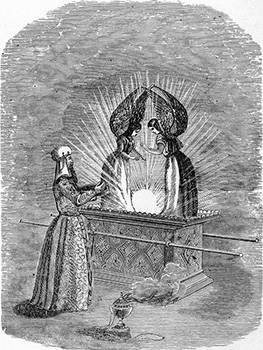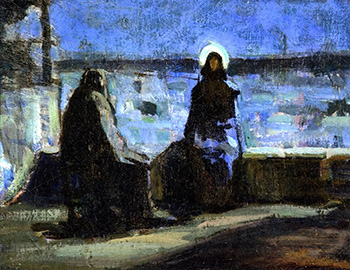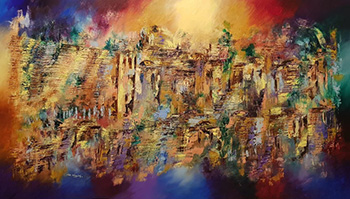For Sunday May 15, 2022
Lectionary Readings (Revised Common Lectionary, Year C)
Acts 11:1-18
Psalm 148
Revelation 21:1-6
John 13:31-45
For earlier essays on this week's RCL texts, see the essay by Debie Thomas, If You Love; and then three essays by Dan Clendenin, The Day of Non-Judgment is Near, "To Carry the Candle Against the Wind", and Back to Basics: Love One Another.
Michael Fitzpatrick is a parishioner at St. Mark's Episcopal Church in Palo Alto, CA. After growing up in the rural northwest, he served over five years in the U. S. Army as a Chaplain's Assistant, including two deployments to Iraq. After completing his military service, Michael has done graduate work in literature and philosophy. He is now finishing his PhD at Stanford University.
Sometime in the next year, my family and I expect to uproot and move somewhere we’ve never lived before, where we know few people, where we will start again from scratch. It’s a terrifying possibility to leave what we know and move towards what we do not know. Whatever demons we encounter in our current area, at least they’re demons we know; whereas in the Great Unknown, we may find demons of untold strength that bowl us over.
These fears and prospects have left me musing about what it means to have a home. Although we’ve lived in our current area for over seven years, it has never really become a home for us. Sure, we have a residence that my wife and I have nested in and filled with two precious kitties. It’s a place where we hide and rest, where we love and learn, where we laugh and cry. But these recent years have taught me that home is far more than four walls and a family. A true home is in a community — a place where we belong. A home is a place where we collaborate with neighbors, celebrate with friends, and lean on a wider network of hugs and helping hands when the brutality of life leaves us bruised and beaten.
Although we’ve had our share of positive relationships, my wife and I find ourselves reflecting on how alien we still feel, that we’re very much outsiders who do not fit into the local culture. We don’t feel at home because the wider community has not always welcomed us.
 |
|
The Mercy Seat, the Jewish peoples first representation of God dwelling in their midst. Drawing by Henry Davenport Northrop, 1894.
|
A harsh reminder came for me this past week during a conversation. As a college-level instructor who teaches ethics and critical thinking, I was sharing my thoughts on some misguided reasoning that has made problem solving certain issues currently facing the United States quite difficult. It was an innocuous comment, not directed at any particular ideology or political tribe, just meant to encourage a bit more humility and less rationalizing as we sort our values as a society. The response astonished me; several people in no uncertain terms told me I had no right even having an opinion on the topic. Although they didn’t say this overtly, the clear implication of their responses was: We do not want to form a moral community with you; leave us alone to make our own decisions.
Their reproach left me feeling bruised and broken. If we are not willing to construct a shared community knit together by common moral values, then how can we form a community at all? How will we be anything more than frantic individuals trying to scrape for what is ours in a world “red in tooth and claw”?
How timely and hopeful are the words of John’s Apocalypse. Fully acknowledging a ruthless and barbarous world that warrants God’s judgment, John tells us that on the other side we will find not destruction but new life — a new heavens, a new earth, a new Jerusalem, not created by hard work, non-profits, or political action committees, but distinctively a work of the Lord pouring out grace onto a broken world. God will do this the way the Lord has always brought redemption: by making a home amongst us mortals.
When the Redeemer delivered the Hebrews out of slavery in Egypt, it was to bring them to a land of promise and security where the Redeeming One would dwell in their midst as the shekinah, and their community would be bound by the righteousness and love of their Deliverer, typified by the Mercy Seat in the Tabernacle.
In the Gospel stories, the Redeemer comes to dwell amongst mortals in a new way by taking up the human frame and living out a fully human life as Jesus of Nazareth, who healed the sick, fed the hungry, had dinner with the unacceptable, and lived a life in which he needed nothing for himself and was thereby free to give away everything to all who asked. To use Dietrich Bonhoeffer’s pregnant phrase, God came as a "man existing for others.” Jesus was God for us.
 |
|
Study for Nicodemus Visiting Jesus by African-American artist Henry Ossawa Tanner, 1899.
|
Looking forward, John declares that this will be the determinative reality — at the end of all things our Creator will once again be the shekinah; because of this, we will finally live as a complete human community. Everyone will be bound in moral responsibility for each other, and it will be a community without tears or mourning or pain. We will be a people who drink from the springs of Life itself.
Yet this vision pertains not only to the coming future, for it is the hope our Sustainer draws us towards even now. St. Peter’s vision, challenging his own tribal prejudices, was a dream of unclean animals being declared clean by their Creator, through which Peter could see how God was creating true community. Peter goes to a Gentile home with God’s instruction to “not make a distinction between them [non-Jews] and us [Jews].”
As Peter shares the Good News with the Caesarean family, “the Holy Spirit fell upon them just as it had upon us at the beginning.” In other words, Peter sees that the foundational event which brought the Church into being, the Pentecostal pouring forth of the Divine Spirit, is breaking barriers and going beyond the Jewish community within which it began. As Peter himself reflects, “If God gave them the same gift that he gave us when we believe on the Lord Jesus Christ, who was I to hinder God?”
Let us not reduce this amazing story to our modern categories. This is not simply a story of “inclusion” or “radical hospitality”. The Spirit-filled community can be a moral community together — sharing possessions, lifting up each other’s burdens, washing each other’s feet, caring for the needs of vulnerable populations, edifying one another in spiritual growth, all without distinctions between persons — because we are bound together by a common life, the very life of God’s own Spirit. It is God at work in our lives that allows us to become fully human, fully responsible members of a community.
As I reflect on my rejection earlier this week, I can see how St. Peter’s vision marks a real change. Our political differences are made subordinate to God giving all people “the repentance that leads to life” — even someone as loathsome as me! What matters is not our status or acceptability, but that God was in Christ making acceptable the unacceptable (to use Paul Tillich’s memorable paraphrase). We can love one another because God has first loved us even when we were unlovely, all of which is just another way of saying that God is making a home amongst even us. And God has always been making a home, and always will be — the real significance of declaring the shekinah to be Alpha and Omega, the beginning and the end. There is nothing God is now doing that has not been the divine work from the beginning or won’t be the divine work in the end.
 |
|
The New Jerusalem by Ora Nissm, an award-winning Israeli female artist, 2017.
|
A real home is one enmeshed in a community of belonging, where we fashion a moral future together by recognizing that no one is dispensable, that there is no one whose judgment and contribution we can do without in forging the moral life. In such a community there can be no right to my own opinion or right to do whatever I want, as this would be to assert that God’s gifts to me are not for you, the very type of exclusion that St. Peter’s vision has foreclosed once for all. All we are permitted to do is “love one another just as I have loved you.” Again, the catalyst is not our human efforts, our goodwill, our just causes, but God in Christ first loving us. God acts first and makes possible our action in response. We can be a community that truly loves one another because we do it not out of our own magnanimity but out of humble response to the Creator who accepted us even when we were unacceptable.
I close with a note on Psalm 148. It’s one of the many hymns in scripture where thanksgiving for the Almighty One flows over in ecstatic excess. Everything is praising God: All the hosts of the heavens, all the inanimate objects, all the celestial wonders, all plants and animals, all manner of people, in every height and depth, in every season and weather. When merit and praise become about our own importance, the moral community dissolves. Without an anchoring center other than ourselves, human attempts at social progress devolve into struggles for power and recognition. Only by focusing our human energies away from ourselves to the One who first loved us, the One who slakes our thirst with springs of living water, the One who offers to all the repentance that leads to life, can we be the people who are known by our love.
Praise the Redeemer who makes a dwelling amongst mortals!
A Weekly Prayer
The Dreamer as Architect by Marly Youmans
Last night in dreams, she lived a thousand years
And was the architect who made a house
That wandered from the mountains to the sea.And in its rooms the strange and marvelous
Began to stir with songs and images
And words of radiance by those who knewThat every stone and changing face and tree
Was singing forth a name, a fullness—word
Of self that joins with music of the spheres.And how that potent work of loveliness
Could fall away, she hardly grasped, though knew
The grief aimed arrows at her flesh, her soul.She kept one room intact and hidden safe,
One jeweled image on the plaster wall,
One melody that curled inside her ear,One archway onto mountainside and sea,
One spell, one tale that murmured: Everything
That dies—for all must die—will be renewed.
Marly Youmans is the author of several novels, including her latest Charis and the World of Wonders (read my 8D review of her book here). She is also a wonderful poet. This poem of hers was first published in the March 2021 issue of First Things.
Michael Fitzpatrick welcomes comments and questions via m.c.fitzpatrick@outlook.com
Image credits: (1) The La Vista Church of Christ, Omaha, Nebraska, USA.; (2) First United Methodist Church, Jacksonville, Texas, USA; and (3) 1stDibs.com.





